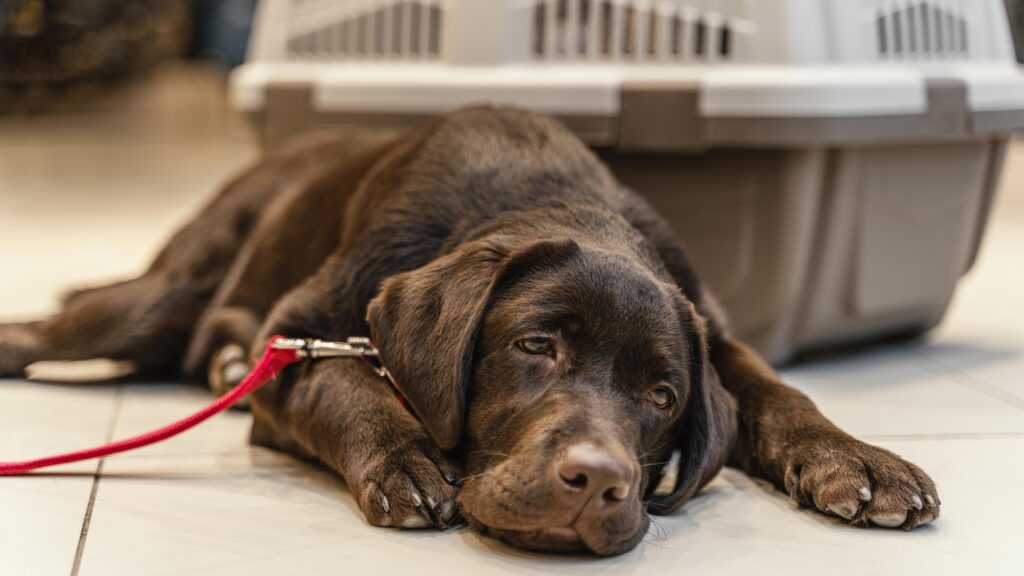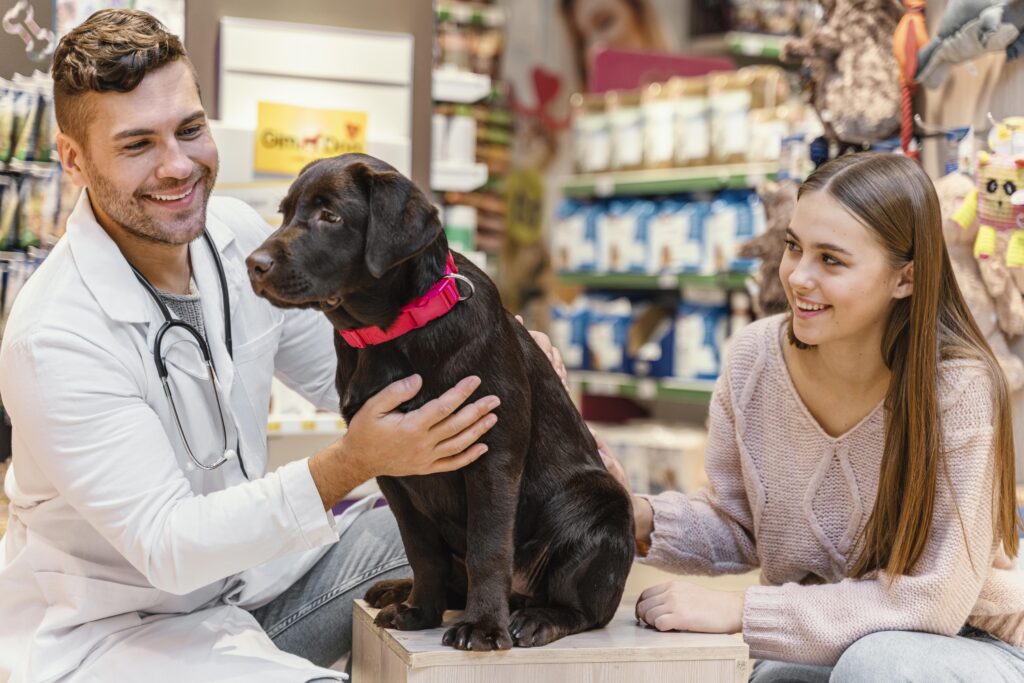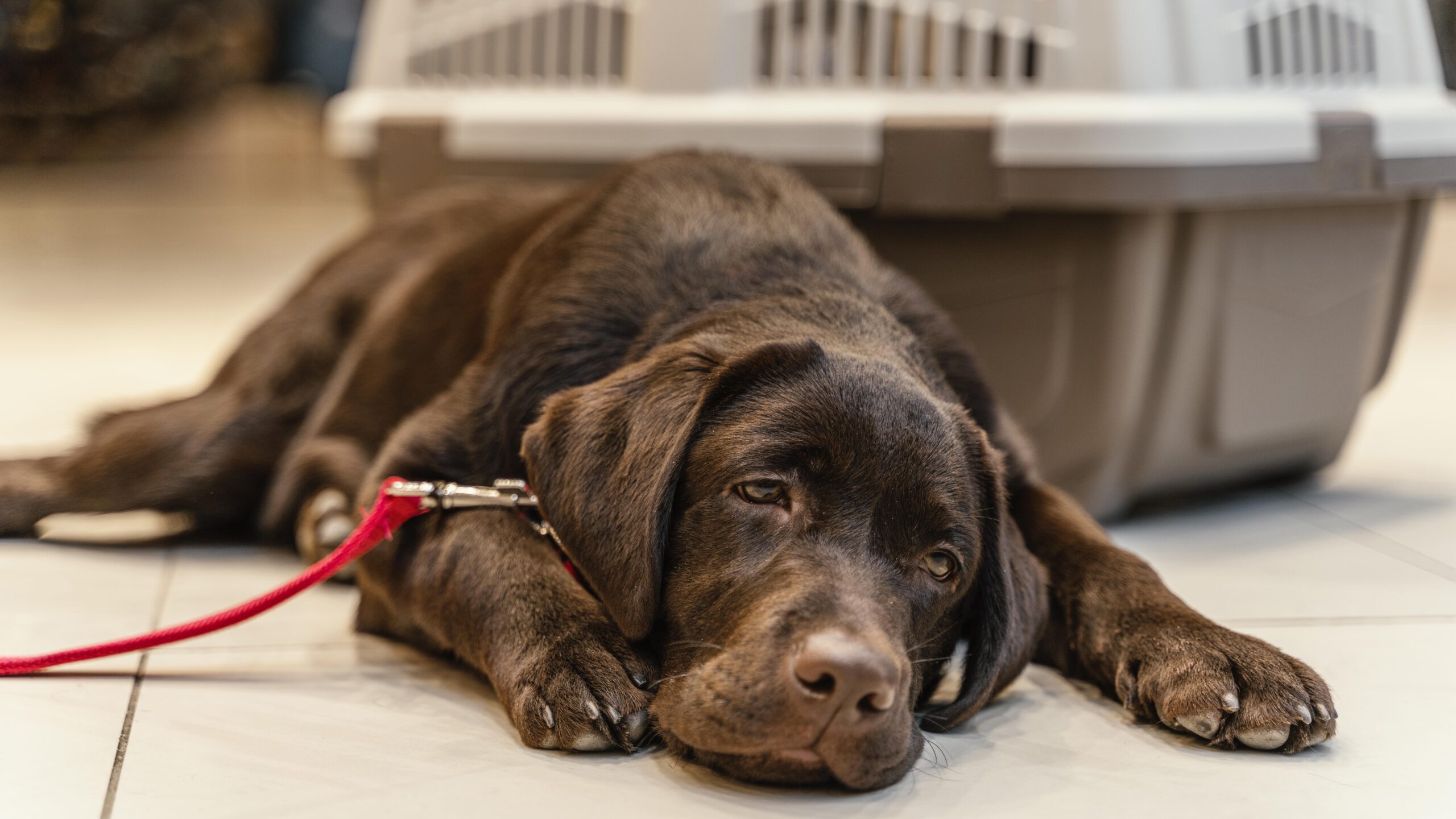Table of Contents
ToggleIntroduction
When we see our dog suffering from diarrhea, it becomes a matter of concern for us. Although this type of problem mostly arises due to dietary negligence, sometimes it can also be a sign of serious problems.Therefore, in such a situation it becomes important to consult our veterinarian first, especially for puppies, old dogs, dogs with health problems or dogs with serious symptoms. This guide, “Safe Home Remedies for Dog Diarrhea,” outlines safe home remedies for managing mild, uncomplicated diarrhea in an otherwise healthy dog, once you’ve gotten the go-ahead from your veterinarian.

Warning : Safe home remedies for dog diarrhea Stop and call the vet immediately if you notice:-
- Blood in the stool: bright red or dark/black sticky stools.
- Vomiting: especially if frequent or accompanied by diarrhea.
- Lethargy/weakness: your dog seems unusually tired, depressed, or weak.
- Loss of appetite: your dog refuses food or water.
- Signs of pain: crying, trembling, hunched posture, or sensitivity to touch on abdomen, etc.
- Fever: hot ears, dry nose (though this is not always reliable), lethargy.
- Severe/watery diarrhea: or diarrhea that persists for more than 24-48 hours despite home care.
- Suspected poisoning: if they have eaten something poisonous (chocolate, grapes, onions, xylitol, human medications, plants, chemicals).
- Stress without much production: may be a sign of blockage.
The Golden Rule: Hydration is Paramount
- Frequent diarrhea causes rapid loss of fluid and electrolytes, which is the biggest and most immediate risk of dehydration. So ensure constant availability of fresh, clean water.
- Monitor dehydration as follows:
- Gums: It should be moist and pink. Dry, sticky gums are a red flag.
- Skin elasticity: Gently pinch the skin on the back of the neck. It should spring back quickly. Slow rebound indicates dehydration.
- Eyes: Sunken eyes may indicate dehydration.
- Energy levels: Extreme lethargy is worrying.
- If you suspect dehydration in your dog or your dog won’t drink water, see a vet immediately. They may need subcutaneous or IV fluids.

Effective & Safe Home Remedies for dog for Mild diarrhea
Once your vet has ruled out serious causes and approved home management, follow these steps:
- Brief Food Withholding (Fasting):
- Purpose:Gives the inflamed gastrointestinal tract a rest.
- For Healthy Adult Dogs:Withhold food for 12-24 hours. NEVER withhold water.
- Important Exceptions:Do NOT fast:
- Puppies under 6-12 months (they lack blood sugar reserves).
- Very small breed dogs.
- Senior dogs.
- Underweight dogs.
- Dogs with certain health conditions (e.g., diabetes).
- For these vulnerable dogs, consult your vet for guidance; often skipping just one meal or offering very small bland meals is safer.
- Introduce a Bland Diet:
- After the fast period,start small, frequent meals (3-4 times per day) of a bland, easily digestible diet.
- Classic Bland Diet Recipe:
- Protein:Boiled, skinless, boneless white meat chicken breast or lean ground turkey (drain ALL excess fat thoroughly). NO seasoning, oils, or butter.
- Carbohydrate:Plain white rice, plain boiled pasta (like macaroni), or plain boiled potatoes (no skin). Canned 100% Pure Pumpkin (NOT pumpkin pie filling) is an excellent addition (see below).
- Ratio:Aim for roughly 1 part protein to 2 parts carbohydrate (e.g., 1/3 cup chicken + 2/3 cup rice per meal for a medium dog).
- Duration:Feed this bland diet for 2-5 days once diarrhea has stopped.
- Transition Back:Once stools are consistently formed for at least 24-48 hours, gradually reintroduce their regular food over 2-3 days:
- Day 1: 75% bland diet / 25% regular food
- Day 2: 50% bland diet / 50% regular food
- Day 3: 25% bland diet / 75% regular food
- Day 4: 100% regular food.
- Canned Pumpkin Power:
- 100% Pure Canned Pumpkin (NOT pumpkin pie filling)is a superstar remedy. It’s high in soluble fiber.
- How it Helps:
- Absorbs excess water in the intestines.
- Adds bulk to stools.
- Soothes the digestive tract.
- Dosage:Mix into the bland food.
- Small dogs: 1 teaspoon per meal
- Medium dogs: 1-2 tablespoons per meal
- Large dogs: 2-4 tablespoons per meal
- Continuefor a few days even after transitioning back to regular food if stools are still soft.
- Probiotics for Gut Health:
- Diarrhea disrupts the balance of good bacteria in the gut. Probiotics help restore this balance.
- Best Choice:Veterinary-Formulated Probiotics: Products like FortiFlora, Proviable, or Visbiome Vet are specifically designed for dogs and contain optimal strains and quantities. Ask your vet for a recommendation.
- Use with Caution: Plain Yogurt or Kefir:Only if your dog tolerates dairy. Choose plain, unsweetened, live-culture Start with a very small amount (1/2 tsp for small dogs, 1 tsp for larger). Discontinue if diarrhea worsens. Human yogurt strains are often less effective for dogs.
- Bone Broth for Hydration & Appeal:
- Purpose:Encourages fluid intake, provides electrolytes and gentle nutrients, often more appealing than plain water.
- Crucial:Must be LOW SODIUM and FREE of onion, garlic, leeks, or other toxic ingredients.
- Best:Homemade: Simmer plain bones (chicken, beef) in water for 12-24 hours. Strain thoroughly. Skim off fat. No vegetables or seasonings.
- Store-Bought:Scrutinize labels meticulously. Only use brands specifically for pets or labeled “low sodium” with safe ingredients.
- Serve:Slightly warm or at room temperature. Offer small amounts frequently.
- Electrolyte Replenishment (Use Under Vet Guidance):
- For mild dehydration alongside water access.
- NEVER give human sports drinks (Gatorade, Powerade)– too much sugar and electrolytes can be harmful.
- Option:Unflavored Pediatric Electrolyte Solution (e.g., Pedialyte):
- Dilute 50/50 with water.
- Offer small amounts frequently.
Consult your vet first for dosage suitability and duration
- Electrolyte Replenishment (Use Under Vet Guidance):
What NOT to Give Your Dog: Dangerous "Remedies"
- Human Anti-Diarrheal Medications (Imodium/Loperamide):Can be TOXIC or even fatal to dogs, especially Collies, Shepherds, and related breeds. Only use under explicit vet instruction and precise dosage.
- Pepto-Bismol / Kaopectate (Bismuth Subsalicylate):Contains aspirin-like compounds. Risks include stomach ulcers, salicylate toxicity (vomiting, tremors, organ damage), and interactions. Avoid without direct vet supervision.
- Any Human Medication:Never administer without veterinary approval.
- Milk or Dairy (except cautious plain yogurt):Often worsens diarrhea due to lactose intolerance.
- Fatty Foods, Grease, Butter, Oils:Irritate the gut and exacerbate diarrhea.
- Spices, Seasonings, Onions, Garlic:Toxic or irritating.
- High Insoluble Fiber (Bran, etc.) Initially:Can be too harsh during acute diarrhea (pumpkin’s soluble fiber is different).
Key Steps for Successful Home Management
- Identify Potential Triggers:Think about recent diet changes, scavenged food, new treats, stress, medications, etc. Inform your vet.
- Prioritize Water:Monitor intake closely. Offer ice cubes if reluctant to drink.
- Implement Fasting (if appropriate) & Bland Diet.
- Incorporate Pumpkin & Probiotics.
- Observe Meticulously:Track stool consistency, frequency, energy, appetite, and hydration. Pick up stool immediately to monitor progress and prevent reinfection/parasite spread.
- Transition Back Slowly:Rushing causes relapse.
- Know Your Limits:If no improvement within 24-48 hours, or if any warning signs appear, stop home treatment and seek veterinary care immediately.
Prevention is Key
- Consistent Diet:Avoid sudden food changes; transition gradually over 7-10 days.
- Limit Table Scraps & Fatty Treats:Major culprits for upset stomachs.
- Prevent Scavenging:Keep trash secure, supervise outdoor time, consider a basket muzzle on walks if needed.
- Manage Stress:Provide a safe space during loud events (thunderstorms, fireworks), introduce changes slowly.
- Regular Parasite Control:Follow your vet’s deworming and flea/tick prevention schedule.
- Toxic Food Awareness:Keep chocolate, grapes, raisins, onions, garlic, xylitol (common in sugar-free gum/candy), alcohol, and caffeine far out of reach.
Conclusion
Mild dog diarrhea can often be managed at home with fasting, a bland diet, pure canned pumpkin, probiotics, and vigilant hydration. However, veterinary consultation is always the essential first step to rule out serious underlying conditions and ensure home care is appropriate. Never use Safe Home Remedies for Dog Diarrhea or other human medications without explicit vet approval. By acting cautiously, prioritizing hydration, and knowing the red flags, you can help your furry friend recover comfortably. Remember, when in doubt, always err on the side of caution and contact your veterinarian. Your dog’s health and well-being depend on it.
Please comment us after reading our guide ” Safe Home Remedies for Dog Diarrhea “
Also Read …………..
